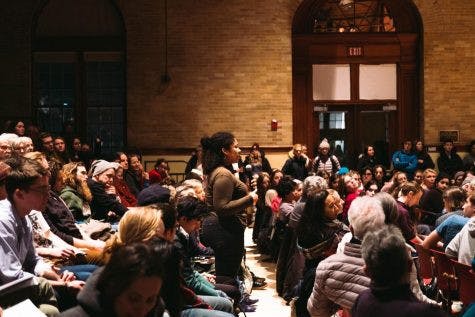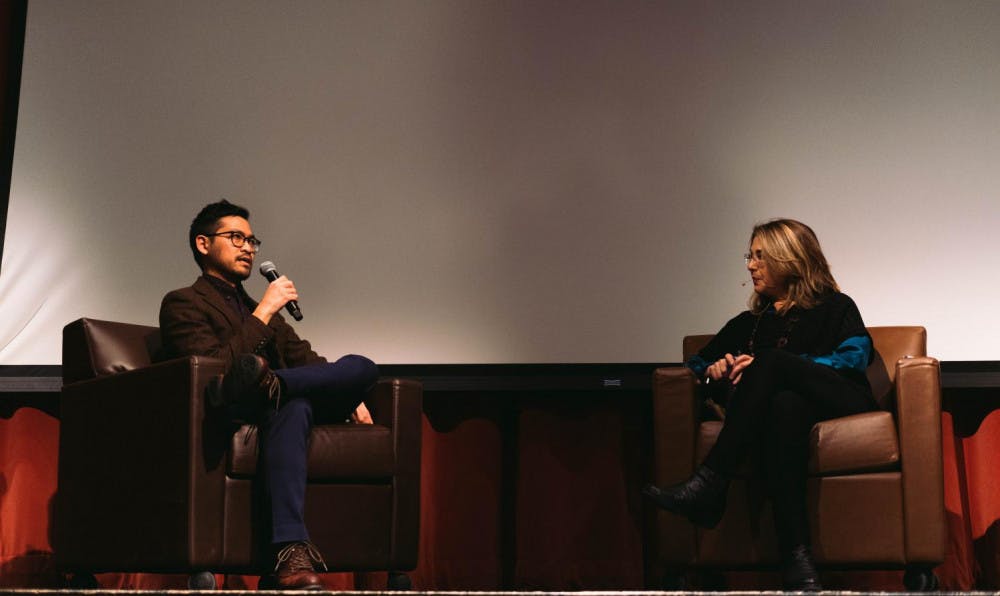Naomi Klein, acclaimed writer and climate activist, brought fire to Wilson Hall last Thursday.
Klein spoke to a packed Wilson Hall about her new book, “On Fire: The (Burning) Case for a Green New Deal” for this year’s Scott A. Margolin ’99 Lecture. The talk addressed justice and hope in a warming world, but fire was the key theme of the night.
Scholar-in-Residence Bill McKibben opened the talk with an abridged account of Klein’s long history in the climate movement, including her work as the first board member of 350.org, the climate action non-profit McKibben founded. Then, Klein and moderator Dan Suarez, a professor of Environmental Studies, took the stage.
Klein described in vivid detail the infernos still burning across Australia and the 2018 fire that claimed 86 lives in Paradise, California. She said that worsening wildfires and other unprecedented natural disasters are, unmistakably, results of global warming.
“I don’t think it is a coincidence that as our planet’s temperature increases, the political temperature is increasing,” Klein said. She identified growing political instability as a key reason behind the rise of far-right leaders like President Donald Trump, Australian Prime Minister Scott Morrison and Indian Prime Minister Narendra Modi.
“They are true planetary arsonists,” she said, “seemingly determined to torch the planet, convinced that their wealth and privilege will protect them.”
But Klein doesn’t think that wildfires and what she dubbed “the fires of hate” are the only important fires of our time. The third fire, she said, “is our fire.”
Klein has a clear message about what to do with that third fire: change everything. A radical future awaits us, she said. We must decide what kind of radical we want it to be. She envisions a future in which we rebuild zero-carbon societies founded on the ideals of equity and resilience. “Why wouldn’t we?” she said. “We’re changing anyway.”
And that change is already visible: three years ago, Klein said, climate ranked 19th on voters’ list of priorities at the Iowa and New Hampshire Democratic primaries. This year, climate came second, only after health care.
The house is on fire, she said, and to truly step into this moment in history, we must all work to clear away the debris from those flames — to move past whatever it is that’s stopping politicians from confronting climate change. For Klein, that means electing Bernie Sanders to the White House. She said she sees Sanders as the only candidate who will treat climate as the priority that it is.
During the Q&A portion of the talk, Suarez asked Klein how young people should deal with the questions of how to live, where to go, what to do, what to learn and who to be in the face of climate change.
“Whatever your expertise is, whatever your passion is, you need to figure out how the emergency is going to reflect in your work,” Klein said.
Lynn Travnikova ’20.5 brought up the question of inclusion and exclusion in the climate movement. “How do we get [people from marginalized communities] inside the conversation, and how do we make sure that regardless of race and socioeconomic status people feel like they are part of that conversation, and their voice matters?” she asked.

For a long time, the mainstream environmental movement has not represented the communities that are most impacted by environmental harms, Klein said. “Those are the communities that need to be first in line to own and control their own renewable energy projects,” she said, referencing the fights against pipelines led by indigenous people as an example of more diverse collaboration.
Suarez told The Campus that the talk, organized by the Environmental Council and other students associated with the Environmental Studies department, aimed to reach students beyond the department who were grappling with what it means to come of age in a time of climate breakdown. He said that achieving the radical transformation Klein called for will take everyone.
“It’s going to take all kinds of roles, all kinds of capacities and all kinds of contexts,” he said.




